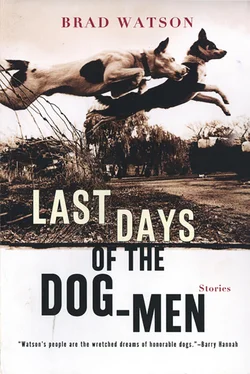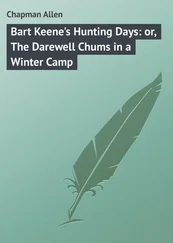“He was getting pretty old,” she said. She took a sip of wine, which was an expensive bottle we’d saved for a special occasion. “I had him put to sleep.”
I’M SURPRISED AT HOW OFTEN DOGS MAKE THE NEWS. There was the one about the dog elected mayor of a town in California. And another about a dog that could play the piano, I believe he was a schnauzer. More often, though, they’re involved in criminal cases — dog bitings, dog pack attacks on children. I’ve seen several stories about dogs who shoot their masters. There was one of these in the stack of old Mobile Registers in the front room. “Dog Shoots, Kills Master,” the headline read. Way back in ’59. How could you not read a story like that? The man carried his shotguns in his car. He stopped to talk to his relative on the road and let the dogs run. When his relative walked on, the man called his dogs. One of them jumped into the backseat and hit the trigger on a gun, which discharged and struck him “below the stomach,” the article said. The man hollered to his relative, “I’m shot!” and fell over in the ditch.
There was another article called “Death Row Dog,” about a dog that had killed so many cats in his neighborhood that a judge sentenced him to death. And another one sentenced to be moved to the country or die, just because he barked so much. There was another one like that just this year, about a condemned biter that won a last-minute reprieve. I’m told in medieval times animals were regularly put on trial, with witnesses and testimony and so forth. But it is relatively rare today.
One story, my favorite, was headlined “Dog Lady Claims Close Encounter.” It was about an old woman who lived alone with about forty-two dogs. Strays were drawn to her house, whereupon they disappeared from the streets forever. At night, when sirens passed on the streets of the town, a great howling rose from inside her walls. Then one day, the dogs’ barking kept on and on, raising a racket like they’d never done before. It went on all day, all that night, and was still going the next day. People passing the house on the sidewalk heard things slamming against the doors, saw dog claws scratching at the windowpanes, teeth gnawing at the sashes. Finally, the police broke in. Dogs burst through the open door never to be seen again. Trembling skeletons, who wouldn’t eat their own kind, crouched in the comers, behind chairs. Dog shit everywhere, the stench was awful. They found dead dogs in the basement freezer, little shit dogs whole and bigger ones cut up into parts. Police started looking around for the woman’s gnawed-up corpse, but she was nowhere to be found.
At first they thought the starving dogs had eaten her up: clothes, skin, hair, muscle, and bone. But then, four days later, some hunters found her wandering naked out by a reservoir, all scratched up, disoriented.
She’d been abducted, she said, and described tall creatures with the heads of dogs, who licked her hands and sniffed her privates.
“They took me away in their ship,” she said. “On the dog star, it’s them that owns us. These here,” she said, sweeping her arm about to indicate Earth, “they ain’t nothing compared to them dogs.”
ON A WARM AFTERNOON IN NOVEMBER, A BEAUTIFUL breezy Indian summer day, the wind steered Lois somehow in her Volkswagen up to the house. She’d been driving around. I got a couple of beers from the fridge and we sat out back sipping them, not talking. Then we sat there looking at each other for a little while. We drank a couple more beers. A rosy sun ticked down behind the old grove on the far side of the field and light softened, began to blue. The dogs’ tails moved like periscopes through the tall grass.
“Want to walk?” I said.
“Okay.”
The dogs trotted up as we climbed through the barbed-wire fence, then bounded ahead, leaping like deer over stands of grass. Lois stopped out in the middle of the field and slipped her hands in the pockets of my jeans.
“I missed you,” she said. She shook her head. “I sure as hell didn’t want to.”
“Well,” I said. “I know.” Anger over Spike rose in me then, but I held my tongue. “I missed you, too,” I said. She looked at me with anger and desire.
We knelt down. I rolled in the grass, flattening a little bed. We attacked each other. Kissing her, I felt like I wanted to eat her alive. I took big soft bites of her breasts, which were heavy and smooth. She gripped my waist with her nails, pulled hard at me, kicked my ass with her heels, bit my shoulders, and pulled my hair so hard I cried out. After we’d caught our breath, she pushed me off of her like a sack of feed corn.
We lay on our backs. The sky was empty. It was all we could see, with the grass so high around us. We didn’t talk for a while, and then Lois began to tell me what had happened at the yet’s. She told me how she’d held Spike while the vet gave him the injection.
“I guess he just thought he was getting more shots,” she said. “Like when I first took him in.”
She said Spike was so good, he didn’t fight it. He looked at her when she placed her hands on him to hold him down. He was frightened, and didn’t wag his tail. And she was already starting to cry, she said. The vet asked her if she was sure this was what she wanted to do. She nodded her head. He gave Spike the shot.
She was crying as she told me this.
“He laid down his head and closed his eyes,” she said. “And then, with my hands on him like that, I tried to pull him back to me. Back to us.” She said, No, Spike, don’t go. She pleaded with him not to die. The vet was upset and said some words to her and left the room in anger, left her alone in her grief. And when it was over, she had a sense of not knowing where she was for a moment. Sitting on the floor in there alone with the strong smell of flea killer and antiseptic, and the white of the floor and walls and the stainless steel of the examination table where Spike had died and where he lay now, and in that moment he was everything she had ever loved.
She drained the beer can, wiping her eyes. She took a deep breath and let it out slowly. “I just wanted to hurt you. I didn’t realize how much it would hurt me.”
She shook her head.
“And now I can’t forgive you,” she said. “Or me.”
IN THE OLD DAYS WHEN HAROLD WAS STILL WITH WESTLEY and I was still with Lois, Harold had thrown big cook-out parties. He had a pit we’d dug for slow-cooking whole pigs, a brick grill for chickens, and a smoker made from an old oil drum. So one crisp evening late in bird season, to reestablish some of the old joy of life, Harold set up another one and a lot of our old friends and acquaintances came. Then Phelan showed up, drunk, with the head of a pig he’d bought at the slaughterhouse. He’d heard you could buy the head of a pig and after an afternoon at the Blind Horse he thought it would be interesting bring one to the barbecue. He insisted on putting it into the smoker, so it would have made a scene to stop him. Every half hour or so, he opened the lid with a flourish and checked the head. The pig’s eyelids shrank and opened halfway, the eyes turned translucent. Its hide leaked beaded moisture and turned a doughy pale. People lost their appetites. Many became quiet and left. “I’m sorry,” Phelan stood on the porch and announced as they left, stood there like Marc Antony in Shakespeare. “No need to go. I’ve come to bury this pig, not to eat him.”
Finally Harold took the pig’s head from the smoker and threw it out onto the far edge of the yard, and Phelan stood over it a minute, reciting some lines from Tennyson. Ike and Otis went sniffing up, sniffing, their eyes like brown marbles. They backed off and sat just outside of the porch light and watched the pig’s head steaming in the grass as if it had dropped screaming through the atmosphere and plopped into the yard, an alien thing, now cooling, a new part of the landscape, a new mystery evolving, a new thing in the world, there whenever they rounded the comer, still there, stinking and mute, until Harold buried it out in the field. After that we pretty much kept to ourselves.
Читать дальше











